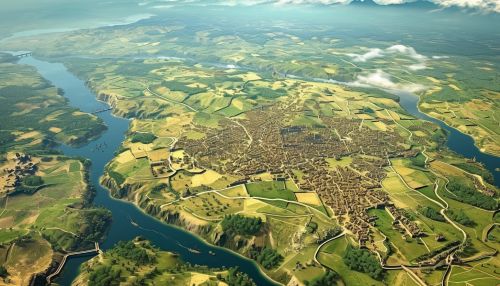Frankish Kingdom
Origins and Early History
The Frankish Kingdom, also known as the Kingdom of the Franks, was a historical political entity that originated during the Late Antiquity period in Western Europe. The Franks, a confederation of Germanic tribes, formed the kingdom in the 5th century, following the collapse of the Western Roman Empire.


The Franks initially settled in the Lower and Middle Rhine region, which is now part of modern-day Netherlands, Belgium, and Germany. They were first recognized as a distinct group by the Romans in the 3rd century. The Franks capitalized on the declining power of the Roman Empire and expanded their territories, eventually establishing a kingdom that would lay the foundation for modern Europe.
Merovingian Dynasty
The first ruling dynasty of the Frankish Kingdom was the Merovingian Dynasty, named after Merovech, a semi-legendary figure who was purportedly the father of Childeric I. The dynasty was established by Childeric's son, Clovis I, who united all Frankish tribes under his rule by 509.
Clovis I is also known for his conversion to Christianity, specifically to the Nicene Christianity championed by the Roman Church. His conversion played a significant role in spreading Christianity across his realm and beyond, earning him the title "Apostle of the Franks".
The Merovingian Dynasty ruled the Frankish Kingdom for over two centuries. However, by the 7th century, the power of the Merovingian kings began to wane, and the kingdom was increasingly controlled by the aristocracy, particularly the office of the Mayor of the Palace.
Carolingian Dynasty
The decline of the Merovingian Dynasty paved the way for the rise of the Carolingian Dynasty. The transition began when Pepin the Short, the Mayor of the Palace, deposed the last Merovingian king, Childeric III, and was elected as the king by an assembly of Frankish nobles.
Pepin's son, Charlemagne, is one of the most renowned figures in European history. Charlemagne expanded the Frankish Kingdom through a series of military campaigns, creating an empire that covered much of Western and Central Europe.
Charlemagne was crowned as the Emperor of the Romans by Pope Leo III in 800, marking the revival of the Roman imperial title in the West. His reign is often associated with the Carolingian Renaissance, a period of cultural and intellectual revival within the Frankish Kingdom.
Decline and Partition
The Carolingian Empire began to decline following the death of Charlemagne. His sole surviving legitimate son, Louis the Pious, succeeded him. However, Louis' reign was marked by civil wars and disputes among his sons over succession.
The Treaty of Verdun in 843 marked the end of the unified Frankish Kingdom. The empire was divided among Louis' three surviving sons, creating the kingdoms of West Francia, East Francia, and Middle Francia. These kingdoms would eventually evolve into the modern states of France and Germany.
Legacy
The Frankish Kingdom played a pivotal role in shaping the political, cultural, and religious landscape of Europe. Its legacy can be seen in the spread of Christianity, the revival of learning and culture during the Carolingian Renaissance, and the development of feudalism, a system of governance that would dominate the Middle Ages.
